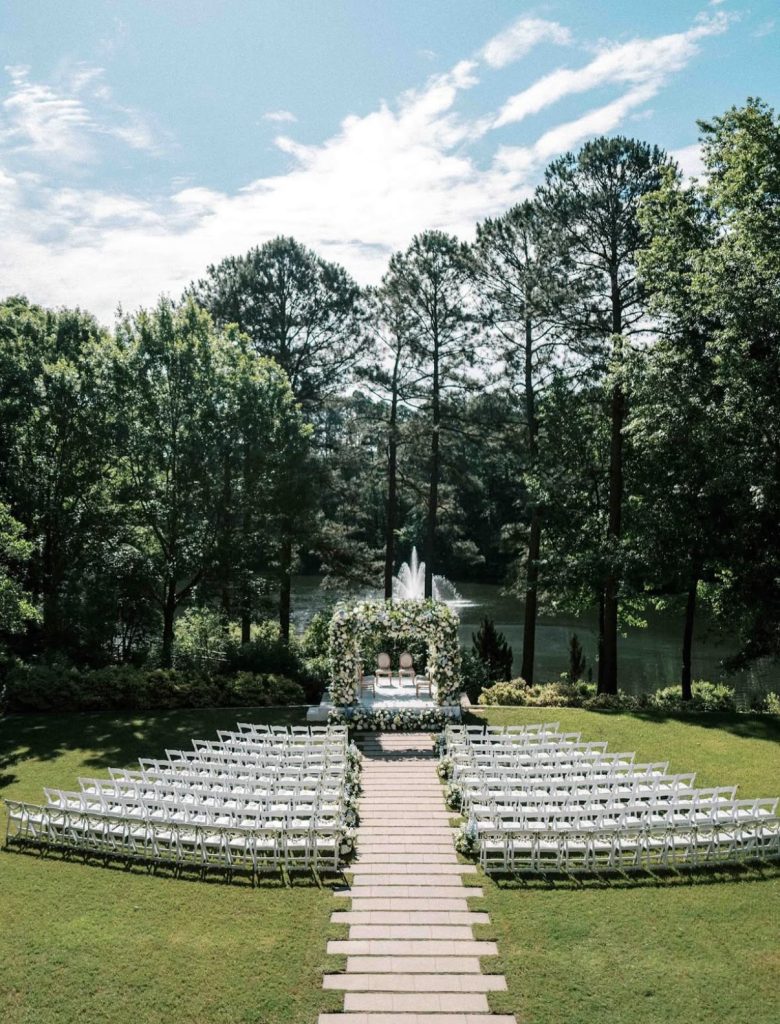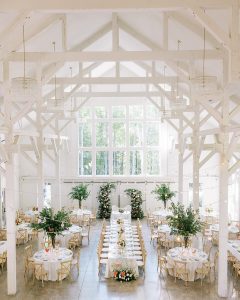Wedding planning isn’t all about the big day. The rehearsal dinner is an important — and enjoyable — part of the wedding celebration, so we’re walking you through all the basics. From who to invite to where to have it, we’re covering everything you need to know to have the best rehearsal dinner.
This wedding tradition can be casual or formal, large-scale or intimate, etc. It all depends on the couple and their preferences. While there is no wrong way to do it, it’s helpful to know the general etiquette along with some pro tips to get you started in the planning process.
(Let’s dive into the details!)

REHEARSAL DINNER 101
There are many wedding traditions, but none as pleasant and enjoyed by so many as the rehearsal dinner. The rehearsal dinner has been around for hundreds of years, and guests often had to travel for days or weeks to attend a wedding. Whether it was an elegant castle or the local public house, guests would be treated to the hospitality of a meal upon arrival with all the other parties involved. Over the years, this has evolved into a sophisticated celebration with planned speeches and more, but ultimately, it’s still about bringing people together.
The big day can often be a whirlwind for the couple, the wedding party, and the family, so this is a lovely opportunity for the inner circle to gather and have a quiet (or loud, depending on how you celebrate) moment together.
What is the Purpose of the Rehearsal Dinner?
The purpose of the rehearsal dinner is to show hospitality to the wedding party and out-of-town guests. This is a time for the two families to meet and enjoy each other’s company.
It is most commonly held the night before the wedding day after running through the wedding rehearsal. In some cases, couples opt to have the rehearsal dinner two days before the event for people to recover, but this isn’t always convenient if you have a significant amount of out-of-town guests.
Does It Have to Be a Dinner?
Not at all. Rehearsal brunch, lunch, etc. All of those options are valid and common. The idea behind the rehearsal dinner is to feed the people in your wedding party (often just after the wedding rehearsal/walk-through) as well as any out-of-town guests, who are most likely extended family.
In some cases, the rehearsal and the dinner or meal have to be scheduled separately. While doing them together is preferable, don’t feel forced into anything. Each couple and their family have a unique circumstance. The heart of the tradition is about being together, sharing your hospitality, and a special moment before the wedding.
What Do You Serve at the Event?
When it comes to the rehearsal dinner menu, the world is your oyster! (Come to think of it — an oyster bar sounds amazing!) The beauty of this event is that you have a lot of flexibility to get creative. With a smaller guest list than your wedding, family-style or foodie-chic options are a lot of fun to delight your family and wedding party with.
If you aren’t sure what type of dinner you’d like to serve, talk to your wedding planner and significant other. Ultimately, this is the choice of the host, but be sure to give any important details to them ahead of time.
Things to consider include —
-
- Budget
-
- Dietary Restrictions/Needs
-
- Guest List Amount (You need a location that can accommodate everyone.)
-
- Important Details (This could be determining whether to have the event close by or having it at a meaningful location for you as a couple.)

Who Hosts the Rehearsal Dinner?
Traditionally speaking, it’s the groom’s family that hosts the event. Another name for this event is Groom’s Dinner. These are essentially two names for the same event, depending on who is responsible for planning and paying.
The hosts are responsible for putting together the guest list and sending out the invitations.
Who is Invited?
Essentially, anyone who needs to be at the wedding rehearsal should be invited to the rehearsal dinner.
Rehearsal Dinner Guest List Includes —
-
- Bridesmaids / Junior Bridesmaids
-
- Maid/Matron of Honor
-
- Groomsmen / Junior Groomsmen
-
- Best Man
-
- Honor Attendants
-
- Ring bearer and/or Flower Girls (and their parents)
-
- Parents of the Bride and Groom
-
- Immediate Family
-
- Out-of-Town Guests (Optional)
-
- Officiant
Any roles in the wedding beyond these are optional but nice to include. Especially when it comes to roles in multi-cultural weddings, the standard rule is if they are participating in your wedding in some way, it’s proper etiquette to invite them.
Invitation Etiquette — Give guests a plus-one option.
Invitations should include —
-
- The name and location of the venue.
-
- The time of the rehearsal practice.
-
- The time of the meal and the location where it will be hosted.
-
- RSVP contact and deadline information.
-
- Menu information whenever possible.
Where Do You Host a Rehearsal Dinner?
This is completely up to the couple. Whether it’s a country club or a restaurant — or even a family home, the options vary by couple and situation. Many venues have rehearsal dinner options on-site, but if that is not the case for you, find a meaningful spot not too far from the rehearsal location.
It’s a good rule of thumb to keep this event more informal than the day itself. This is for multiple reasons. You don’t want to overshadow the big day, but also, you want this to be a warm and inviting environment where people can get to know each other.
What Happens at the Event?
Because this event is chiefly about the two families coming together and everyone getting to know each other, it’s best to keep things simple and easy to navigate. For you, this may mean having some games to encourage people being able to engage more easily or simply keeping it low-key with a family-style dinner vibe.
However you choose to plan your event, here is what is traditionally done at the rehearsal dinner—
-
- Give everyone an opportunity to meet and greet each other. The hosts, as well as the parents and couple, should initiate introducing people to each other.
-
- The host often welcomes people collectively before the meal.
-
- If appropriate, this is also when the officiant or party member blesses the meal.
-
- After the meal, gifts are often presented to the wedding party by the couple with a collective sentiment of thanks to the entire group. (In some cases, this includes the parent’s gifts, but many prefer to make that a private moment.)
-
- The groom often toasts his new bride at this time.
-
- Toasts and speeches are then given by the Fathers of the bride and groom.
-
- Some take this time to allow for general toasts by guests but remember that primary speeches should be saved for the wedding day.
-
- The closing of the event is a good moment for the hosts, couple, or wedding planner to make any announcements and reminders about logistics for the big day.
As much fun as these evenings can be, remember that this should wrap up by 10 p.m. and not get too raucous. You will need these people refreshed and at their best for the wedding day.

PRO TIPS YOU NEED TO KNOW TO HAVE THE BEST REHEARSAL DINNER
Now that we’ve answered the initial questions, let’s talk about the pro tips you need to know to have the best rehearsal dinner — ever.
-
- Don’t forget to hire a photographer for the rehearsal dinner. (Even if this is just a friend, this is a special and intimate moment in your wedding celebration that is worth documenting.)
-
- Make a schedule.
-
- Pick a theme. (This helps when picking the venue.)
-
- Don’t plan an extravagant event because that’s not the point of the dinner and it could overshadow the wedding.
-
- Don’t host it at a location far away from the wedding venue/rehearsal location.
-
- Be sure to give yourself (and your guests) plenty of time to get from the rehearsal location to the dinner — but also be mindful that it isn’t too long in between.
-
- Remember that this event doesn’t need to have a huge budget or lots of moving pieces. Keep it simple.
-
- Be sure to help guests by letting them know what to expect from the meal details to the dress code. Don’t make them work to find out, and worse, don’t answer 20 of the same questions via text on your rehearsal day.
-
- Be mindful not to overeat. You don’t want to feel bloated or ill the night before the wedding. (It’s not a must, but just something to keep in mind.)
-
- As fun as the party might be — don’t keep your guests out too late. (You want everyone feeling their best and well-rested for the big day.)
-
- Remember the purpose of this event and soak in these moments with the important people in your life. Be sure to let them know how grateful you are for them and how happy you are that they are part of this celebration.
Other Local Vendors:
Umbrella Dry Bar








